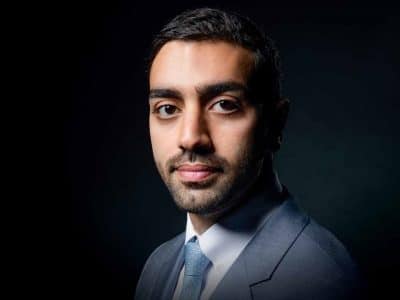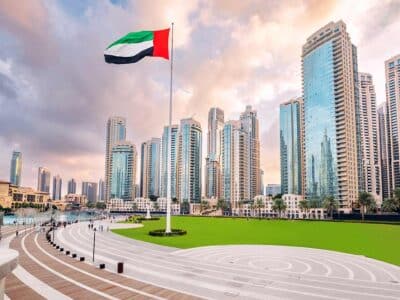Palestine’s fractured history over the past 50 years has seen numerous wars and peace proposals. The conflict with Israel, described as the world’s most intractable, has had a crippling effect on the economy of the West Bank and, in particular, Gaza.
The most recent war lasted seven long weeks and led to the deaths of 2,104 people in Gaza — 69 percent of whom were civilians, according to the UN.
The Palestinian economy, all the while, is attempting to move on and provide a stable living for its 4.6 million strong population. At the heart of any economy is the banking sector, and during last year’s conflict a total of 17 local and foreign banks tried their best to maintain some level of operation in Gaza.
Despite the difficulties of last year, Bank of Palestine remains a strong performer, and based on its third-quarter results, the bank looks on course to record modest growth when its results are announced in April.
The biggest Palestinian bank, which is publicly listed on the local stock exchange with a market cap of $443.2m (14 percent of the total market cap), recorded third-quarter profits worth $8.6m, bringing its nine-month total to $27.6m.
They are impressive figures, particularly when the bank had to close the doors in its 15 branches across Gaza (20 percent of its retail operations) for almost the entire duration of the war, only opening sporadically for people to access cash and to replenish some of the ATM machines.
People still came to the branches to deposit money in the bank, where it was perceived to be safer than keeping it at home, which might have been at risk of being bombed.
“It was a nightmare,” recalls Hashim Shawa, chairman and general manager of Bank of Palestine.
“It was two months of bombing and a terribly devastating war. Thankfully we didn’t have any major direct hits on the bank in terms of the shelling; there was a lot of damaged glass windows and doors, but no major damage,” he adds.
While no members of staff were killed, one employee lost most of his family when a rocket hit their apartment.
“He was sitting in their apartment in what was supposed to be a safe neighbourhood — the Israelis would warn where they were going to bomb so people would move from that area and go to neighbours, family or friends in another area to seek refuge. Unfortunately, they moved from the area they thought would be bombed and their apartment got hit by
helicopter rockets directly,” says Shawa.
“This particular employee is a manager in the IT department, a very bright young man. Oxford graduate and super whizz kid, very smart and in the peak of his career. He lost his wife, who was nine months pregnant, his two young children — five and three-year-old boys — his mother, his sister. They were all in the same apartment.
“Just by fluke, he had gone into a room next door with his dad. It was during Ramadan, just before breaking the fast. All of the people [in] the other room were killed, while he and his dad were injured in the room next door,” he explains.
Shawa’s appointment as head of the bank was also tinged with sadness.
Established by his grandfather, Hashem Atta Shawa in Gaza in 1960, it started out as an agricultural bank, helping farmers develop their citrus business.
“Our family was in the citrus business back then and exporting oranges and grapefruit to Europe. He [the grandfather] established the bank as an agricultural bank, helping farmers, mainly in the citrus sector, to basically help them with loans for farming equipment, like irrigation systems.
“It was good that he established the bank because the citrus business took a hit because of the Israeli occupation in 1967, and all of the [subsequent] wars. That whole sector has been wiped out. The whole coastline from Gaza all the way to Jaffa was famous for oranges,” Shawa says.
His father, Dr Hani Shawa, took over the running of the bank in the early 1990s.
After establishing a banking career in his own right with Citibank, and later HSBC, Hashim Shawa returned to Palestine after his father passed away suddenly in 2007.
“Although we were always planning a succession of me being more involved in the bank, becoming his deputy and eventually become CEO and chairman, all of those plans had to be fast-forwarded in difficult circumstances, on a personal front, and also [because of] the whole environment in 2007/08, which was the devastating war in Gaza,” Shawa says, now aged 38. He was just 31 when he took over as chairman and general manager.
It was also the year that the Lehman Brothers financial crisis hit, and while Palestine was largely insulated from that fallout, it was still a very difficult time for the banking sector in general.
Fast forward to 2015 and Bank of Palestine is now the second-largest private sector employer in the country, behind the telecoms company Paltel, with 1,300 employees across its 54 branches.
The Palestinian economy differs from most in the Middle East region, with 90 percent of businesses operating in the micro and SME sector. The population is also quite young, with 75 percent aged under 34. It all adds up to plenty of opportunity for growth, Shawa says.
“It’s a great thing, to have such a young population. It’s a good foundation for any company that wants to set up business and develop its growth strategy in any sector. Anyone would be happy to see such a population pyramid.
“We have a healthy target market of customers coming in every year, adding new customers, and they’re going to be looking at personal, home and business loans,” he says.
With a lot of family-run small businesses in Palestine, Shawa says the banking sector has yet to see its full potential with underbanked population.
“Maybe less than 60 percent of the population is banked. There are only 258 branches in all of Palestine, for all the banks that are operating in Palestine. For a population of 4.6 million, that’s not a lot of branches. People are still putting their money under the floorboard and under the mattress, so there’s a lot of potential for growth,” Shawa says.
“For small businesses, it’s worse. About 55-60 percent of small and micro businesses are not banked. Most of them don’t have financial statements or accounts, so their ability to access loans and finance is restricted because they’re still at an early stage in their knowledge and ability to have proper bookkeeping,” he adds.
Bank of Palestine has been proactive in taking banking services to the people.
“We have hired dozens of new, well-trained credit officers who go and visit micro and small businesses, and also help with accounting and give financial advice, so they can access the funding,” says Shawa.
Most of Bank of Palestine’s business comes from retail banking, and the growing mortgage business represents around 5 percent.
“We were one of the first to introduce mortgages in Palestine five years ago. Just as the whole mortgage-loan crisis happened in 2008, we started our mortgage industry in Palestine. It was unheard of to get access to 20, 25-year mortgages in Palestine. Almost impossible, but we did that on proper principles,” he says.
“There still isn’t the same culture of mortgages, and people don’t really like to borrow so much. They don’t mind placing deposits with you. Borrowing is not taboo, but it’s not the immediate thing one would freely do. But it’s slowly changing. People are realising it’s okay to get a loan,” he adds.
Even with the onset of war, payments kept coming in. Palestine has one of the lowest default rates in the Middle East, with a 2.3 percent non-performing loan (NPL) rate.
“That’s something we’re very proud of. Our customers are very good. They also don’t over-borrow. They put in more from their own money, rather than resorting to bank financing. People don’t want to have a debt burden hanging on their neck. People are very proud of their name and reputation and they won’t run the risk of ruining that. We had cases of people in Gaza coming to the bank to close down loans and repay fully because they were afraid of dying,” he says.
Outside of the SME sector, industry in Palestine is predominantly services — banking, telecoms and insurance, but the country also boasts some prominent pharmaceutical manufacturers, some of whom export to North Africa and one that is certified in Germany.
“There’s also a newly thriving high-tech sector in the ICT [information and communications technology] sector. There are a lot of new start-ups, which is something very recent. Because of the pyramid population, we have a lot of bright sparks doing some amazing stuff on computers,” says Shawa, adding that Bank of Palestine is in the final stages of launching a venture capital fund of $10m to support the up-and-coming start-ups.
“It’s purposefully small, because it’s the first of its kind and it’s to invest in early stage, to give start-up funding for these high-tech companies, giving them mentorship, advice, connect with the network. The bank has invested $1m and we’ve already raised about $7m,” he says.
Shawa believes the economy in Palestine, with a current GDP of $7.3bn, has the ability to double in size. The unemployment rate rose to 27 percent following the last war, but he believes employment opportunities would be there if the country didn’t have the constraints primarily caused by Israeli occupation.
“We have hardly any control over our natural resources, borders, entry points, exports/imports are heavily controlled and restricted. A lot of losses to our economy are as a result of this crippling occupation. Sixty percent of our land is restricted — we can’t farm it or develop it. 80 percent of our water is restricted — we can’t freely irrigate. The agriculture sector alone probably loses about $2.2bn a year from the restrictions,” he says.
“Estimates indicate that our GDP could probably be almost double what it is if we had free access to our own resources and we had freedom of travel, movement and access.
“Even our air is restricted. 3G frequencies for telecoms are switched off, so we can’t use the internet on our mobile phones,” he adds.
Tourism, in particular, is where Palestine would benefit from greater freedom, Shawa says.
“We don’t have gas or oil [like the UAE], but we have some of the most important holy sites, like Bethlehem and the Nativity Church. It’s a unique site and it’s very sad that it only receives 1 million tourists a year. As a contrast, the Sistine Chapel in the Vatican City in Rome receives about 6 million tourists a year.
“East Jerusalem has the Holy Sepulchre Church and the Al Aqsa Mosque. They should receive tens of millions of tourists alone. I think Makkah has about 10 million pilgrims a year. There should be 15 to 20 million tourists a year. Tourism only contributes about 3 percent to our GDP and for a country like Palestine, it should contribute about 15 to 20 percent,” Shawa says.
While developments in those sectors will take time, much of the focus in recent month has been about rebuilding Gaza.
“There was a big reconstruction effort conference in Egypt [in October] where billions of dollars [$5.4bn] were pledged by global international community, but we’re hoping that that will be translated to real development on the ground and reconstruction. Up to now we’re still not seeing any major progress but we remain hopeful,” Shawa says.
“The beauty is the Palestinian people and businesses are so resilient. We did a quick check of all our customers during the war and some of them, their entire businesses were wiped out, but they were undeterred and they are willing to start again, and we’re willing to help finance them and help them get on their feet again. That kind of determination is inspirational,” he adds.
Bank of Palestine, he says, has been doing its part as well. Its sponsorship of the Palestinian national football team in their debut Asian Cup appearance in Australia was an opportunity to develop the diaspora network the bank has been building. With 40,000 Palestinians living in Australia, Shawa says they hope to include many of them in their global network of expats now living in Chile, the US and the GCC. While the simple aim of the network is to connect its citizens, he says the bank also hopes to encourage people to invest in Palestine.
And this is why Bank of Palestine will soon open a representative office in the Dubai International Financial Centre (DIFC).
“We’re starting with a representative office. From this hub here, we will connect with the community here in the UAE. We will present to them investment opportunities of what they can do in Palestine — both diaspora and foreign investors,” Shawa says.
“We want [to] change the perception of Palestine. Yes, there’s a lot of turmoil in the region, but there is also the positive side. There’s an economy that, yes, is suffering, but there’s a lot of successful businesses that are operating in the very difficult environment, but are yet resilient and doing very well, producing profits and giving dividends,” he adds.
Shawa points to the 49 companies listed on the Palestinian Stock Exchange, which averages around a 6 percent return on investment per annum.
“Eighty percent of the companies listed are profitable and it has been a bit insulated from all this global financial crisis. It has been a good place for some smart, emerging market funds that have looked at this niche and have identified Palestine as a good place to park some money and make decent returns,” he says.
The representative office will employ one person to head it up, plus support staff, but Shawa says there are no plans to develop it into a branch.
“There’s no definite plan to have branch outlets everywhere. We are deliberately forcing ourselves to promote foreign investment into Palestine, so therefore my near to medium objective is not to put a lot of effort into banking customers here [in Dubai] and taking care of their financial needs here in the UAE and offering loans and financing projects here. We want to develop the Palestinian economy and to do that we want to get investors, Palestinian or not, to come put their money in Palestine,” he says.
Top of the list for investments is his own Bank of Palestine, which he says is “doing quite well in a difficult environment”.
“Bank of Palestine produces a return on equity of mid to high teens, every year, consistently. We’re averaging around 15 percent return on equity and we’re very profitable. We’re still at an early stage — there’s still a lot [of] potential for penetration, and banking, and more sophisticated products and services, and more loans. We’re very liquid. We’re running at a 55 percent loan-to-deposit ratio. We have twice as much deposits as loans. Most banks in the world would be in love with such numbers,” Shawa says.
The bank, he says, will also look to promote other investment opportunities in Palestine.
“We’re one opportunity, but we want them [investors] to use us as the gateway to other opportunities in Palestine. The telecoms stocks are producing good dividends, as are pharmaceutical. We have a brokerage arm subsidiary of the bank that can get access to the whole [Palestinian stock] market,” he says.
While everyone is waiting to see how the reconstruction of Gaza progresses, and if general sentiment in Palestine improves, Shawa believes that a solid peace process will deliver untold rewards for his country.
“Palestine, eventually, will have an airport and a seaport. Easyjet will fly from London to Palestine one day. It’s a four-hour flight and we have a lot of sunshine in Palestine, great food. It’s a destination, and it’s right next to Europe. It has great potential,” he says.
“There are 8 million Palestinians around the globe and they represent about $100bn of net worth around the world. If our GDP is around $7.5-$8bn and if we can get 1 percent of the net worth of the global diaspora community [7.5 million], for them to chip in into the development of the Palestinian economy, that’s significant.
“And I think we’re a perfect platform to facilitate that. We’re a bank that’s been through 55 years, we’ve seen it all. We’ve proved the test of time, and all the trials of turmoil, and we’ve got through it,” he says.
Shawa has a wonderful vision for his country and it’s a vision that deserves to be realised.







